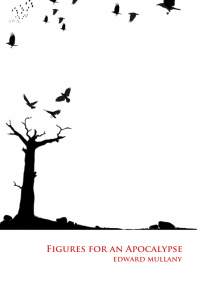 Figures for an Apocalypse
Figures for an Apocalypse
by Edward Mullany
Publishing Genius Press, 2013
198 pages / $14.95 buy from Publishing Genius
Rating: 7.5
Edward Mullany’s newest collection of prose poetry is titled from a book by Thomas Merton. Merton is known for being a Trappist monk and poet, but his poetry receives mixed reviews. In Commonweal, William Henry Shannon lambasts a vast majority of the volumes of Merton’s poetry as “mediocre or just plain bad”; however, Shannon concedes that amongst the thousands of lines of poetry “one will also find fine poetry there.”
In many cases, the mark of fine poetry is to appear effortless—and, perhaps, in some cases craftless. Edward Mullany’s newest poems seem to be nothing more than simple titles with surreal imagery acting as a sort of call and response. Take “The Statues of Weeping Women” for example: “Along empty highways they / were placed at equal / intervals.” That’s the whole poem.
Other pieces in the collection are seemingly plotless, page-length prose poems which simply describe everyday occurrences, as in “The Wrong Child” wherein a girl’s mundane day of school is described in exacting detail:
Or as in “Say No” which starts by saying
My mother decided to remarry.
But at the last minute she and the guy got in an argument.
I went to his house and punched him one in the face.
and continues to describe the repercussions of the aforementioned fisticuffs. It would be easy to write these pieces off as amateur, but that would be reductive. The quiet moment that follows the punch in “Say No” distills a familiarity of human experience in an expert way, as when Mullany writes
[The party guests] looked upon me as if I was part of a lower class, which I was. I went back out and sat on the stoop. [The guy] followed me out with an icepack on his nose.
Neither of us spoke.
There were things I wanted to say, but the more I thought about them, the less important they seemed.
David Foster Wallace said in his commencement address to Kenyon that if we choose to see things a certain way, we can commune with the frustratingly dull and see that it’s “on fire with the same force that made the stars: love, fellowship, the mystical oneness of all things deep down.” This is exactly what is happening in Figures for an Apocalypse. Edward Mullany takes what appears to be banal and elevates it to what is tantamount to holy significance. There are no frills here. The poetry is plain and deliberate, but it is hauntingly familiar.
Tags: Edward Mullany, Figures for an Apocalypse, Publishing Genius Press
